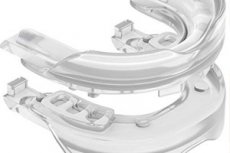Medical expert of the article
New publications
Preparations
Snoring mouth guards
Last reviewed: 04.07.2025

All iLive content is medically reviewed or fact checked to ensure as much factual accuracy as possible.
We have strict sourcing guidelines and only link to reputable media sites, academic research institutions and, whenever possible, medically peer reviewed studies. Note that the numbers in parentheses ([1], [2], etc.) are clickable links to these studies.
If you feel that any of our content is inaccurate, out-of-date, or otherwise questionable, please select it and press Ctrl + Enter.

Snoring usually occurs when a sleeper breathes through their mouth, and the air passing through causes vibration of the involuntarily relaxed (sagging) soft tissues of the oropharynx. In some cases, a device worn at night, called an anti-snoring mouthguard, can eliminate the symptoms of this breathing disorder. [ 1 ]
Indications for use
Special mouth guards (oral devices or applicators) can significantly reduce habitual snoring during sleep. But the causes of snoring are different, and the indications for using mouth guards are quite limited. If excess body weight, a nasal polyp or a deviated nasal septum interfere with normal breathing during sleep, mouth guards will not help. [ 2 ]
The mouth guards are designed to increase the lumen of the upper respiratory tract by moving the lower jaw forward (by a few millimeters), as a result of which the muscles of the tongue and tissue in the lower jaw area are in a tense state and do not descend into the back of the throat.
In some cases, it is advisable to use mouth guards for sleep apnea (except obstructive), as well as night bruxism (teeth grinding).
How to use anti-snoring mouth guards?
If desired, an adjustable or non-adjustable individual mouth guard for snoring can be made based on a dental impression. A non-adjustable individual mouth guard holds the jaws still, while an adjustable mouth guard allows you to adjust the position of the jaws and even move them.
Names of mass-produced oral applicators include:
- mouth guard against snoring Stop snoring solution (country of origin – China);
- Anti-snoring mouth guard Anti snore (Anti-snoring) – also made in China;
- anti-snoring mouthguard Sonight (C-onight) of Russian manufacture;
- adjustable anti-snoring mouth guards SomnoFit-S (Switzerland);
- SnoreRX Plus, SomnoGuard SP and VitalSleep mouthguards (USA), etc.
All of them are made of thermoplastic materials, are designed to adapt to individual bite and are used in the same way.
According to the included instructions, to obtain the desired shape, before using the thermolabile mouth guard you need to:
- heat it by placing it in hot water (not higher than +80°C): Stop snoring solution and Anti snore – for 20-25 seconds, C-onight – for five minutes, SnoreRX – for 30-60 seconds;
- remove from hot water and cool for a few seconds in a container with cold water;
- Place the heated mouth guard in front of the mirror and close your jaws tightly, i.e. bite your upper and lower teeth and hold in this position for two to three minutes. The tongue should be pressed to the palate;
- Remove the mouth guard from your mouth and place it back in cold water to secure the bite shape you have achieved.
The mouth guard is then put on before going to bed, and during sleep it prevents the relaxed lower jaw from shifting back.
Contraindications for use
Contraindications to the use of mouth guards against snoring include:
- removable dentures;
- dental braces;
- incomplete row of teeth in the upper jaw (less than seven to nine teeth).
- inflammation of the gums or periodontium (with increased tooth mobility);
- dysfunction of the temporomandibular joint of any etiology;
- inflammatory diseases of the nasopharynx;
- severe obesity;
- epilepsy.
Contraindications also include use for children under 12 years of age. First of all, so as not to disrupt the physiological formation of a correct bite, and also due to the fact that snoring most often occurs with adenoids in children - due to chronic nasal congestion.
Use during pregnancy is not recommended, since the main causes of snoring during this period are weight gain, as well as swelling of the mucous tissues of the nasopharynx (which is caused by increased estrogen levels).
Possible side effects
Using a mouth guard against snoring can lead to dry mouth, hypersalivation (increased salivation), and temporomandibular joint disorder (which causes pain in the jaw and surrounding chewing muscles).
Attention!
To simplify the perception of information, this instruction for use of the drug "Snoring mouth guards" translated and presented in a special form on the basis of the official instructions for medical use of the drug. Before use read the annotation that came directly to medicines.
Description provided for informational purposes and is not a guide to self-healing. The need for this drug, the purpose of the treatment regimen, methods and dose of the drug is determined solely by the attending physician. Self-medication is dangerous for your health.

